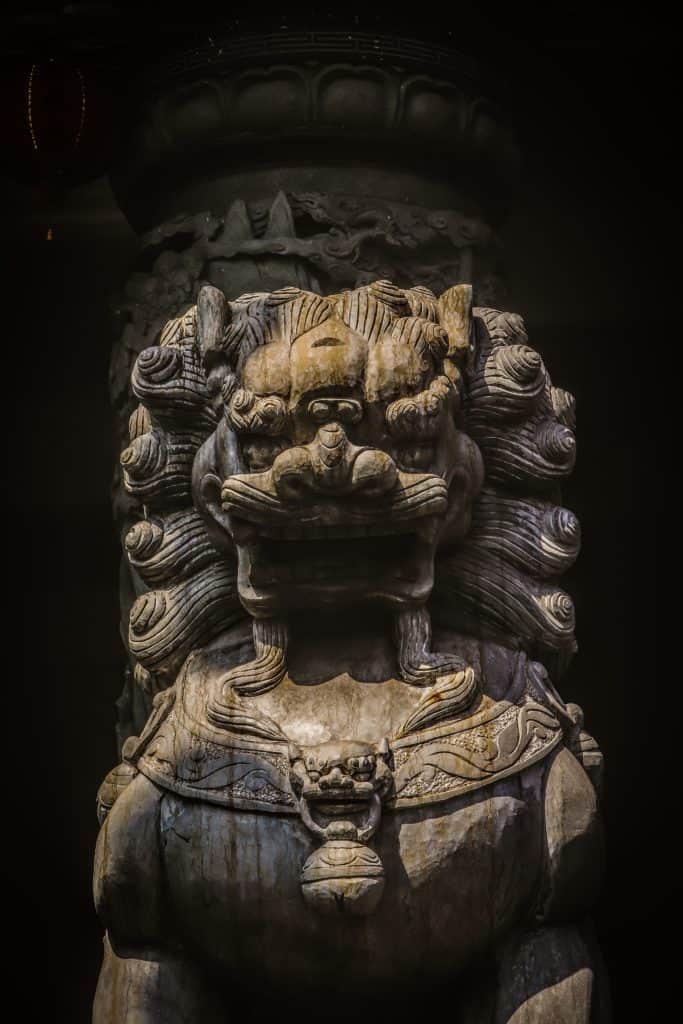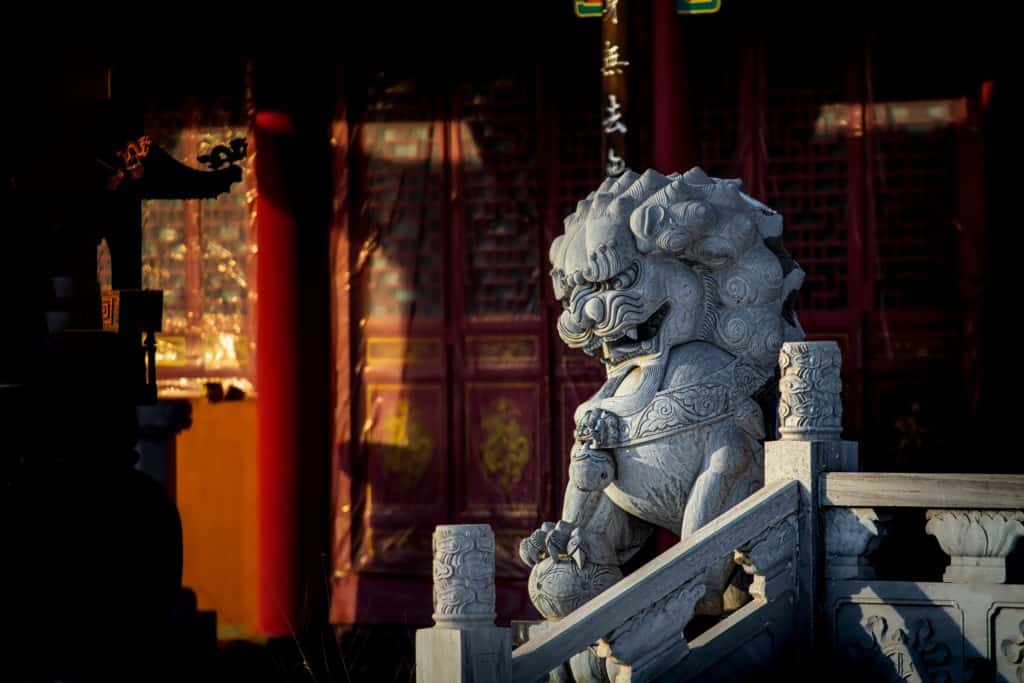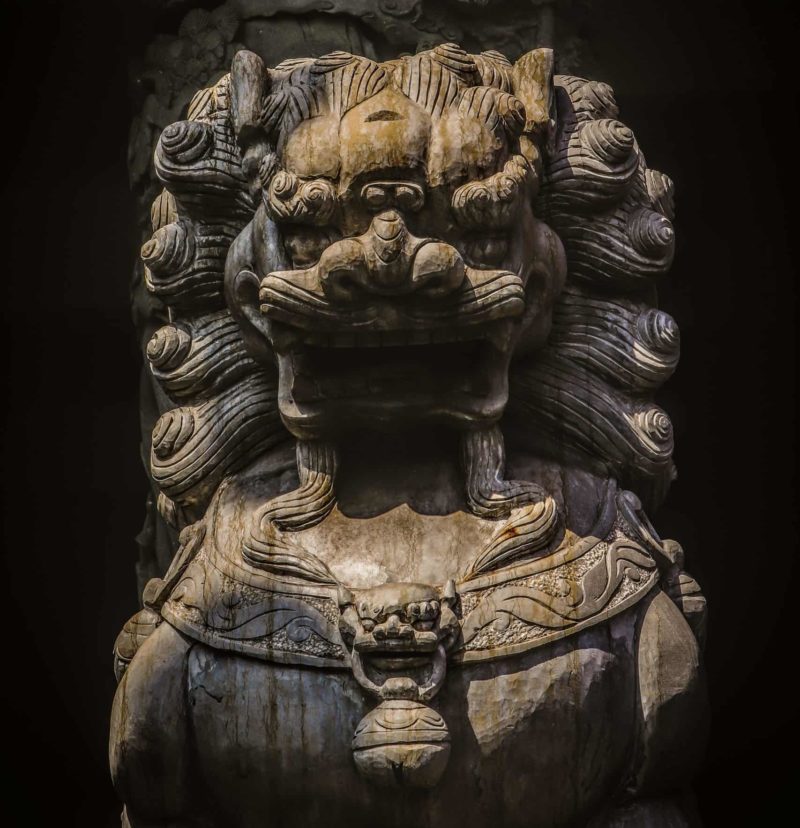Did you know there’s a famous poem in Chinese composed of one sound and one sound only? What is this one-sound poem? How do you read a poem with only one sound? Welcome to the tale of the “Lion-Eating poet in the Stone Den”.

One of the most famous poems written in Classical Chinese is The “Lion-Eating Poet in the Stone Den”. It’s renowned for being composed of only one sound. One sound! The sound “shi”.
Is it a poem or a tongue-twister?
On the one hand, this text deserves to be called a poem. It still manages to use different characters and mean something!
On the other hand, as a one-sound poem, with lots of different tones, it also interestingly becomes quite the tongue twister.
When you’re learning Chinese, tongue twisters are always a challenge and a great way to practice your tones, so let’s explore this one!
Facts about the “Shi shi Shi” poem
- Often informally referred to as the “shi shi shi” poem, the poem’s full name in English is: “The Lion-Eating Poet in the Stone Den“.
- This poem’s name, in Chinese characters, is 施氏食獅史. In Pinyin, that would be “Shī shì shí shī shǐ.”
- This text was composed by the Chinese-American linguist, scholar, and poet Yuen Ren Chao in the 1930s. Mr. Chao also significantly contributed to the modern study of Chinese grammar.
- The sound “shi” is the only sound in the poem. You find it 94 times (in some versions, there are only 92). Only the tones differ. That’s right!
- Mr. Chao wrote this poem as a linguistic demonstration.
- Therefore, the poem shows that writing a one-syllable text that means something is possible.
- That’s because Chinese is a tonal language. So, the same syllable can have a different tone and correspond to a different character. Pawwsitively fascinating.
A one-sound poem that makes sense… in writing
This short narrative poem is written in Classical Chinese.
What is Classical Chinese? Also called Literary Chinese, or 古文, Classical Chinese is the written form of Old Chinese. It was used for literature and all formal texts, from the 5th century BC to the 2nd century AD, end of the Han Dynasty. It actually continued being used as a literary language, for all formal writings, until the 20th century!
Since Classical Chinese is a written language, this poem makes a lot of sense in writing.
That’s because different Chinese characters compose it. More importantly, you have no trouble getting its meaning when you read it. That is if you’re somewhat familiar with Classical Chinese, which is a lot more condensed than modern Chinese.
Why did its composer write this poem as a “one sound poem”?
The poet behind this clever text wanted to make a linguistic demonstration. So, to create a fun tongue-twister of a poem with just one sound, he used the fact the Chinese language is full of homophones (i.e., words that sound the same but mean different things). When read in modern Mandarin, every syllable sounds the same: “shi”.
In other words: if you read this poem out loud, orally, it becomes challenging to understand.
In the same vein, if you try to read it in pinyin, you won’t be able to understand it either. That’s why it’s important to learn Chinese characters
Read the whole one-sound poem in Mandarin Chinese

《施氏食狮史》
石室诗士施氏,嗜狮,誓食十狮。
氏时时适市视狮。
十时,适十狮适市。
是时,适施氏适市。
氏视是十狮,恃矢势,使是十狮逝世。
氏拾是十狮尸,适石室。
石室湿,氏使侍拭石室。
石室拭,氏始试食是十狮。
食时,始识是十狮尸,实十石狮尸。
试释是事。
As this poem is written in Classical Chinese, it’s good to know that it was composed using single characters rather than the double characters that are more commonly found in modern Chinese.
Let’s see the poem in pinyin now, just for fun.
Read the one-sound poem in pinyin
« Shī Shì shí shī shǐ »
Shíshì shīshì Shī Shì, shì shī, shì shí shí shī.
Shì shíshí shì shì shì shī.
Shí shí, shì shí shī shì shì.
Shì shí, shì Shī Shì shì shì.
Shì shì shì shí shī, shì shǐ shì, shǐ shì shí shī shìshì.
Shì shí shì shí shī shī, shì shíshì.
Shíshì shī, Shì shǐ shì shì shíshì.
Shíshì shì, Shì shǐ shì shí shì shí shī.
Shí shí, shǐ shí shì shí shī shī, shí shí shí shī shī.
Shì shì shì shì.
That made a lot of sense, right? I told you it was going to be fun!
What does this poem mean?
Okay, now, it’s time to prove that this one-sound poem actually means something! Here’s the translation of the Poem in English.
« The Lion-Eating Poet in the Stone Den »
In a stone den was a poet called Shi Shi, who was a lion addict and had resolved to eat ten lions.
He often went to the market to look for lions.
At ten o’clock, ten lions had just arrived at the market.
At that time, Shi had just arrived at the market.
He saw those ten lions and, using his trusty arrows, caused the ten lions to die.
He brought the corpses of the ten lions to the stone den.
The stone den was damp. So he asked his servants to wipe it.
After wiping the stone den, he tried to eat those ten lions.
When he ate, he realized that these ten lions were, in fact, ten stone lion corpses.
Try to explain this matter.
See? This poem is full of meaning! The poor poet thought he would eat, only to find stones instead!
Hear it read out loud
Ready to test yourself? Here’s what you can do:
1. Practice your Chinese pronunciation with the many dialogues and speaking stages on Ninchanese
2. Try reading this one-sound poem aloud and see how good your tones are!
Have fun, little dragons!
And one more thing…
If you want to continue learning Chinese with authentic and entertaining content, then you’ll love Ninchanese.
With Ninchanese, you get a complete method to learn Chinese, which has you speaking, reading, writing, and more in Chinese. What’s more, whether you’re a beginner or an advanced learner, there’s content your level on Ninchanese and plenty more!
Start using Ninchanese on the web, with your computer or tablet, or on your phone with the Android app.
The Nincha Team
Stay in touch with us on Facebook, Twitter, Instagram, and Pinterest.





